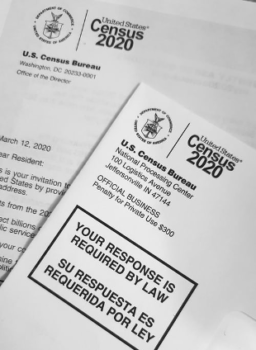
Photo provided courtesy of unsplash.com
By Shreya Desai, Staff Writer
The Unites States Constitution mandates that Congress carry out a census every ten years, counting each person residing within the country and its territories. [1] The count is to be conducted by a non-partisan government agency, the United States Census Bureau. [2] The census count impacts the number of representatives that each state will be allocated at the various levels of government, and how much funding they may receive for things like education and social services. [3] This year, due to the Coronavirus pandemic, the Trump administration sought to shift the timeline for census counting operations, initially seeking a four-month extension; however, in July 2020, the administration changed positions and instead called for the count to end by September 30, 2020, sparking litigation across the country. [4] Additionally, the Trump administration sought to exclude undocumented immigrants from the count, going against the wording of the constitution which mandates that all residents in the country be counted. [5]
Several organizations including National Urban League, League of Women Voters, Black Alliance for Just Immigration, the National Association for the Advancement of Colored People (NAACP), and others, joined forces to bring suit against the United States Department of Commerce and the United States Census Bureau, as well as the heads of both departments, for violations of the Enumeration Clause and the Administrative Procedure Act. [6] Judge Lucy Koh of the United States District Court for the Northern District of California issued a preliminary injunction to suspend September 30th as the end date for the counting of residents within the country. [7] Judge Koh’s ruling was based on the finding that a shortened census schedule was likely to produce inaccuracies in numbers of groups that were already historically undercounted, namely, immigrants and racial minorities, which would ultimately affect the redistribution of seats allocated in the House of Representatives. [8] ; Furthermore, Judge Koh found that the plaintiffs of this lawsuit would likely prevail by arguing that the administration’s actions were arbitrary and capricious, [9] or not based in the law. [10]
Following an appeal by the Department of Justice, the United States Supreme Court ruled on October 13, 2020 that the Trump administration could stop the 2020 census count early. [11] October 15, 2020 marked the last day to be counted. [12] Civil rights advocates and census experts raised concerns that ending the count two weeks early would result in numerical inaccuracies. [13] Then, just days later, on October 16, 2020, the Court announced that it would review the administration’s efforts to exclude undocumented immigrants from being taken into consideration when allocating congressional seats. [14] This issue of omitting any immigrants from the census count has been criticized by some as unconstitutional. [15] There is no comprehensive list that separates undocumented immigrants from legal residents. [16] For this reason, critics fear that the omission of some immigrants from the census count will result in the omission of all immigrants from the count. [17]
While some critics were concerned with congressional representation allocation, others voiced their concern for potential loss of federal funding for their municipalities. [18] The results of the count will impact the distribution of nearly $1.5 trillion of federal tax money. [19] Mayor Sam Liccardo of San Jose, California, which lost $200 million in federal funding after the 2010 census, now fears that his city may lose even more funding following this decade’s count. [20] Mayor Liccardo remarked, “a census count delayed is justice denied.” [21] Despite the criticism, the United States Census Bureau has reassured critics that 99.9% of households throughout the nation have, in fact, been counted. [22]
While supporters and critics of the census’s early ending on either side of the aisle continue to comment, it is likely the numbers will be subject to review once they are released. [23] The statutory deadline by which the United States Census Bureau must deliver a complete and accurate accounting of the country’s population is December 31, 2020. [24] Thereafter, numbers for apportionment of congressional seats could be presented to the new Congress by early January of 2021. [25] The House of Representatives could reject the numbers altogether, but even if they accept the count, individual states retain the opportunity to contest the number of congressional seats awarded. [26] Moreover, the incoming Congress or President could request revisions, or even a new census count. [27]
The hope remains that the results of the 2020 census count bring stability rather than a new wave of litigation.
[1] U.S. Const., Art. I, § 2.
[2] https://2020census.gov/en/what-is-2020-census.html
[3] https://www.brennancenter.org/issues/gerrymandering-fair-representation/fair-accurate-census/2020-census-litigation
[4] https://www.npr.org/2020/09/24/912071784/court-orders-census-counting-to-continue-through-oct-31-appeal-expected
[5] https://www.washingtonpost.com/local/social-issues/what-the-supreme-courts-rulings-mean-for-the-2020-census-and-trumps-attempt-to-exclude-the-undocumented-from-the-count/2020/10/17/5d299b98-0f71-11eb-8a35-237ef1eb2ef7_story.html
[6] https://www.documentcloud.org/documents/7217559-National-Urban-League-Sept-24-2020-Order.html
[7] https://www.npr.org/2020/09/24/912071784/court-orders-census-counting-to-continue-through-oct-31-appeal-expected
[8] Id.
[9] See 5 U.S.C.S. § 706 (LexisNexis, Lexis Advance through Public Law 116-163, approved October 2, 2020)
[10] https://www.npr.org/2020/09/24/912071784/court-orders-census-counting-to-continue-through-oct-31-appeal-expected
[11] https://www.nytimes.com/2020/10/13/us/supreme-court-census.html?auth=login-email&login=email
[12] https://www.npr.org/2020/10/13/921428056/supreme-court-allows-trump-administration-to-end-census-early
[13] https://www.washingtonpost.com/local/social-issues/what-the-supreme-courts-rulings-mean-for-the-2020-census-and-trumps-attempt-to-exclude-the-undocumented-from-the-count/2020/10/17/5d299b98-0f71-11eb-8a35-237ef1eb2ef7_story.html
[14] Id.
[15] Id.
[16] Id.
[17] Id.
[18] https://apnews.com/article/us-news-census-2020-c6cb554611d328b423ac508e5008f9cd
[19] https://www.politico.com/news/2020/10/13/supreme-court-allows-census-count-to-cease-429248
[20] https://www.usnews.com/news/politics/articles/2020-10-13/statisticians-and-census-takers-worry-about-counts-accuracy
[21] Id.
[22] https://apnews.com/article/us-news-census-2020-c6cb554611d328b423ac508e5008f9cd
[23] https://www.washingtonpost.com/local/social-issues/what-the-supreme-courts-rulings-mean-for-the-2020-census-and-trumps-attempt-to-exclude-the-undocumented-from-the-count/2020/10/17/5d299b98-0f71-11eb-8a35-237ef1eb2ef7_story.html
[24] Id.
[25] Id.
[26] Id.
[27] Id.